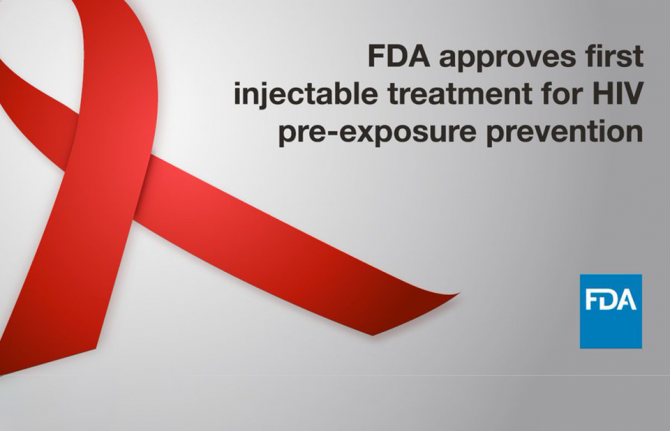

Press Statement
UNAIDS welcomes the approval of long-acting injectable cabotegravir as a pre-exposure prophylaxis for HIV prevention
22 December 2021 22 December 2021The United States Food and Drug Administration announced its first approval of a long-acting HIV prevention medication earlier this week. The long-acting injectable cabotegravir (CAB - LA) is approved as a pre-exposure prophylaxis (PrEP) for adults and adolescents who are at risk of acquiring HIV sexually in the United States of America.
This is the first time an injectable antiretroviral drug becomes available as a pre-exposure prophylaxis for prevention of HIV. The long-acting formula is a step forward and a valuable addition to the HIV prevention toolbox and will make acceptance and adherence easy.
A long-acting PrEP product such as CAB-LA, taken initially as two injections one month apart and then after every two months afterward, could offer a better choice for adults and adolescents at substantial HIV risk who either do not want to take or struggle with taking a daily tablet. Companies holding new technologies should share their knowledge and recipes with generic producers to ensure availability and affordability in low and middle-income countries.
UNAIDS is calling for this new drug to quickly be made available and affordable to people who need it most not just in the United States of America but everywhere in the world. The mistakes of three decades ago when lifesaving drugs were only available to those who could afford it must not be repeated. Market strategies such as generic competition and public health-oriented management of intellectual property rights, either through voluntary agreements or the use of TRIPS flexibilities must be used to make this new drug widely available.
To make this drug available equitably across the world, a series of actions are essential. Firstly, the drug has to be approved by regional and national regulatory authorities in a speedy manner. It is encouraging to see that the developer of CAB-LA, has already submitted to the South African Health Products Regulatory Authority (SAHPRA) for approval and an outcome is expected in early 2022. However access must go much further. Secondly the selling price must come down through a combination of measures such as licencing and involvement of generic producers. Thirdly, national HIV prevention programmes must prepare roll out plans and prepare their health systems and communitiues to deploy this new HIV prevention option as soon as they are available.
Current pre-exposure prohylaxis--Tenofovir plus Emtricitabine—tablets have to be taken daily as oral PrEP. They are highly effective in preventing HIV acquisition among persons at substantial risk when taken as prescribed. However many find it challenging to take a daily tablet. Another option—dapiviringe vaginal ring—is becoming available as additional prevention option for women at substantial risk of HIV infection.
The CAB-LA option could be a game-changer for the HIV response, making PrEP simpler or less burdensome for all genders. This may also circumvent the stigma associated with daily oral therapy and improve correct dosing and adherence which is critical for PrEP effectiveness.
This week’s United States Food and Drug Administration approval follows results from two trials. The first trial, HPTN 083, was conducted in 4 566 gay men and men who have sex with men and transgender women at research centers in Argentina, Brazil, Peru, the United States, South Africa, Thailand, and Vietnam. CAB – LA reduced the risk of sexually acquired HIV by 66% compared to daily oral. In the second trial HPTN 084, among 3,223 at-risk women aged 18-45 across 20 trial sites in seven countries in Sub Saharan Africa (Botswana, Eswatini, Kenya, Malawi, South Africa, Uganda, and Zimbabwe), CAB – LA reduced the risk of acquiring HIV by 89% compared to daily oral PrEP.
UNAIDS
The Joint United Nations Programme on HIV/AIDS (UNAIDS) leads and inspires the world to achieve its shared vision of zero new HIV infections, zero discrimination and zero AIDS-related deaths. UNAIDS unites the efforts of 11 UN organizations—UNHCR, UNICEF, WFP, UNDP, UNFPA, UNODC, UN Women, ILO, UNESCO, WHO and the World Bank—and works closely with global and national partners towards ending the AIDS epidemic by 2030 as part of the Sustainable Development Goals. Learn more at unaids.org and connect with us on Facebook, Twitter, Instagram and YouTube.
